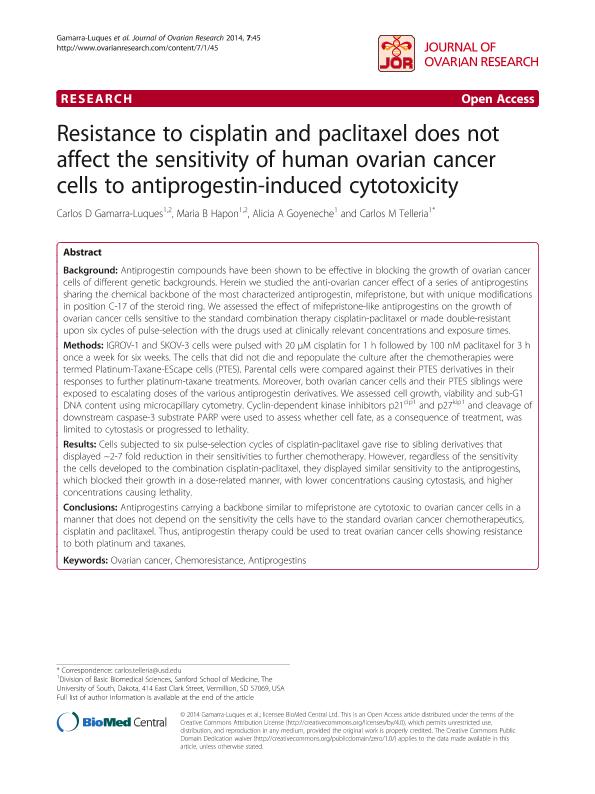Artículo
Resistance to cisplatin and paclitaxel does not affect the sensitivity of human ovarian cancer cells to antiprogestin- induced cytotoxicity
Fecha de publicación:
04/2014
Editorial:
BioMed Central
Revista:
Journal of Ovarian Research
ISSN:
1757-2215
Idioma:
Inglés
Tipo de recurso:
Artículo publicado
Clasificación temática:
Resumen
BACKGROUND: Antiprogestin compounds have been shown to be effective in blocking the growth of ovarian cancer cells of different genetic backgrounds. Herein we studied the anti-ovarian cancer effect of a series of antiprogestins sharing the chemical backbone of the most characterized antiprogestin, mifepristone, but with unique modifications in position C-17 of the steroid ring. We assessed the effect of mifepristone-like antiprogestins on the growth of ovarian cancer cells sensitive to the standard combination therapy cisplatin-paclitaxel or made double-resistant upon six cycles of pulse-selection with the drugs used at clinically relevant concentrations and exposure times.
METHODS: IGROV-1 and SKOV-3 cells were pulsed with 20 μM cisplatin for 1 h followed by 100 nM paclitaxel for 3 h once a week for six weeks. The cells that did not die and repopulate the culture after the chemotherapies were termed Platinum-Taxane-EScape cells (PTES). Parental cells were compared against their PTES derivatives in their responses to further platinum-taxane treatments. Moreover, both ovarian cancer cells and their PTES siblings were exposed to escalating doses of the various antiprogestin derivatives. We assessed cell growth, viability and sub-G1 DNA content using microcapillary cytometry. Cyclin-dependent kinase inhibitors p21(cip1) and p27(kip1) and cleavage of downstream caspase-3 substrate PARP were used to assess whether cell fate, as a consequence of treatment, was limited to cytostasis or progressed to lethality.
RESULTS: Cells subjected to six pulse-selection cycles of cisplatin-paclitaxel gave rise to sibling derivatives that displayed ~2-7 fold reduction in their sensitivities to further chemotherapy. However, regardless of the sensitivity the cells developed to the combination cisplatin-paclitaxel, they displayed similar sensitivity to the antiprogestins, which blocked their growth in a dose-related manner, with lower concentrations causing cytostasis, and higher concentrations causing lethality.
CONCLUSIONS: Antiprogestins carrying a backbone similar to mifepristone are cytotoxic to ovarian cancer cells in a manner that does not depend on the sensitivity the cells have to the standard ovarian cancer chemotherapeutics, cisplatin and paclitaxel. Thus, antiprogestin therapy could be used to treat ovarian cancer cells showing resistance to both platinum and taxanes.
Palabras clave:
Mifepristone
,
Ovarian Cancer
,
Paclitaxel
,
Cisplatino
Archivos asociados
Licencia
Identificadores
Colecciones
Articulos(IMBECU)
Articulos de INST. DE MEDICINA Y BIO. EXP. DE CUYO
Articulos de INST. DE MEDICINA Y BIO. EXP. DE CUYO
Citación
Gamarra Luques, Carlos Diego; Hapon, María Belén; Goyeneche, Alicia; Telleria, Carlos Marcelo; Resistance to cisplatin and paclitaxel does not affect the sensitivity of human ovarian cancer cells to antiprogestin- induced cytotoxicity; BioMed Central; Journal of Ovarian Research; 7; 4-2014; 45-50
Compartir
Altmétricas




